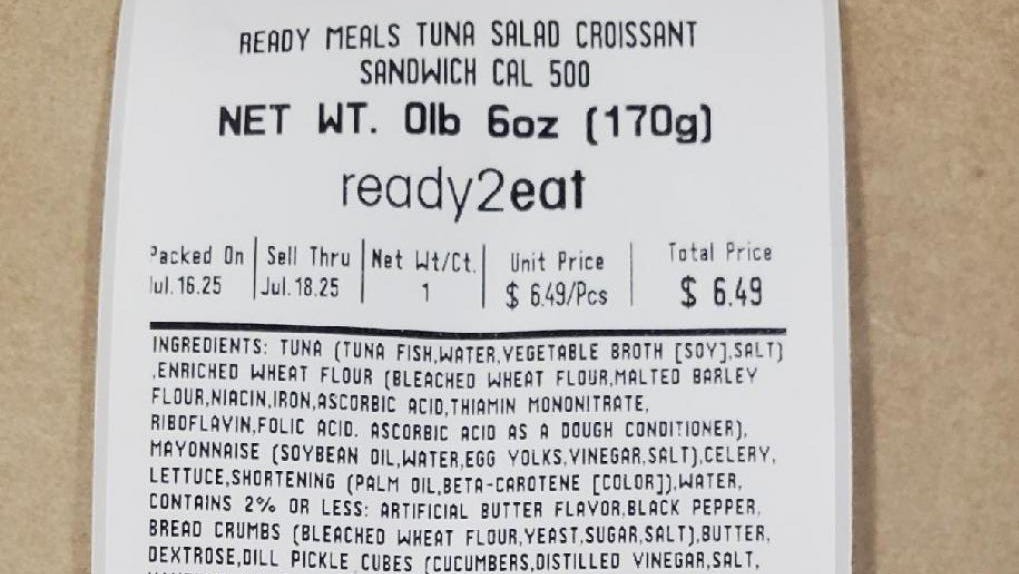news
Tuna Salad Recall at Albertsons, Randalls Over Listeria Risk
Albertsons, Randalls and Tom Thumb locations across Arkansas, Louisiana, Oklahoma and Texas are recalling tuna salad products from Reser’s Fine Foods due to listeria risk.
Published July 24, 2025 at 1:48pm by Marley Malenfant

Albertsons, Randalls and Tom Thumb locations across Arkansas, Louisiana, Oklahoma and Texas are voluntarily recalling certain tuna salad products sourced from Oregon-based Reser’s Fine Foods.
According to a Tuesday announcement from the Food and Drug Administration, all affected products contain tuna salad made with breadcrumbs potentially contaminated with listeria monocytogenes.
While healthy individuals may experience mild, short-term symptoms, the Centers for Disease Control and Prevention warns that listeria poses a serious risk to young children, older adults, and people with compromised immune systems. In pregnant women, it can lead to miscarriage, stillbirth, premature birth or severe newborn infections.
What tuna salad products were recalled?
These 10 products were recalled in Albertsons, Randalls and Tom Thumb stores:
What is listeria?
According to the CDC, listeria is an infection caused by bacteria that can contaminate foods — especially soft cheeses, deli meats and unpasteurized dairy, which haven’t undergone a process used to kill harmful bacteria. It can be especially dangerous for pregnant women, adults over the age of 65, and individuals with weakened immune systems.
What are the symptoms tied to E. coli vs. listeria?
You can get listeriosis by eating food contaminated with listeria monocytogenes. E. coli contamination is typically spread when feces come into contact with food or water, the CDC says. Food handlers can spread infection when they do not use proper hand-washing hygiene after using the restroom. Some wildlife and livestock may also spread E. coli to food and food crops.
Listeriosis symptoms may start the same day you eat contaminated food, but are more likely to begin within two weeks after consumption and may start as late as 10 weeks later, according to the FDA. But E. coli infections typically occur three to four days after consuming the germ, according to the CDC.
Mild listeriosis may include fever, muscle aches, nausea, fatigue, vomiting and diarrhea. Serious infections may lead to headaches, a stiff neck, confusion, loss of balance, and convulsions. E. coli infections can cause severe stomach cramps, diarrhea (often bloody) and vomiting for around five to seven days.
What should customers do if they have a recalled product in their home?
It's good to be aware if you recently purchased a recalled product. There are steps to follow if you do have these products in your home. According to FoodSafety.gov, here are the steps you should take.
- Don’t panic: The majority of food recalls are not directly linked to an outbreak of foodborne illness. Instead, many recalls are initiated due to the potential risk of contamination in the food product. In such cases, food manufacturers often issue a recall as a preventive measure to safeguard consumers.
- Don't eat the food or consume the drug: To ensure your safety, refrain from consuming any recalled food products. Always prioritize caution over convenience. Additionally, please refrain from donating the recalled food to food banks or providing it to your pets, as they are also susceptible to food poisoning.
- Don't open the food: To prevent foodborne illnesses, refrain from opening and inspecting food. Bacteria and viruses responsible for such illnesses are invisible, odorless, and tasteless. If you do handle the product, ensure you thoroughly cleanse your hands with warm water and soap for 20 seconds afterward.
- Check the recall notice to find out what to do with the food: Upon a food product recall by a manufacturer, specific instructions are provided regarding the product's handling. These instructions generally entail one of the following actions: Return the product to the original store of purchase for a refund. Dispose of the product safely to prevent it from being consumed by humans or animals, especially if the packaging has been opened.

